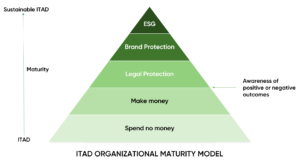
One year on from the introduction of the U.S. Inflation Reduction Act (IRA), many observers’ worst fears of its detrimental impact on the U.K. green economy have not yet materialized — but there is certainly no room for net zero policy prevarication if the U.K. wants to take advantage of the surging green goods market.
That is the thrust of a report published by the cross-party think tank Social Market Foundation, which argues the IRA has not prompted the wave of economic protectionism that many observers had foretold, and has instead galvanized the market for green goods around the world.
The IRA, which came into force 12 months ago, aims to direct hundreds of billions of dollars in subsidies and incentivizes towards clean technologies in the U.S., and is expected to create millions of jobs while helping the country slash its emissions. Good news for both the climate and U.S. clean tech entrepreneurs, certainly. But it has also prompted many trade, technology and clean energy experts in the U.K. to warn of an exodus of investment across the Atlantic, and has put ministers under significant pressure to establish a more ambitious green industrial strategy as a result — calls that so far appear to have fallen on deaf ears.
However, SMF argued that — so far at least — the IRA’s impact on the U.K. green economy may not not been as detrimental as some commentators had initially feared, largely because content requirements for “green” trade introduced by the U.S. over the past year have proven to be more elastic than expected, applying to a “minority of goods in a handful of sectors.” It also contends that, with just 13 percent of U.K. goods exported to the U.S., the country remains significantly less exposed to U.S. trade barriers than some observers anticipated. Indeed, the EU market is by far the greatest importance in terms of U.K. trade, and there a door for British manufacturing has been left firmly open by the bloc’s decision to cap its target for EU-produced content at 40 percent, it said.
Against that backdrop, SMF goes even further in its assessment of the IRA’s positive potential for the U.K., arguing the landmark climate legislation in fact presents a major opportunity for British exporters, because it has turbocharged a race for clean technologies that can reduce emissions, energy bills and countries’ risky reliance on petrostates. As such, the think tank urged policymakers to not see the IRA as a threat — but to embrace its legacy as a major new frontier of green economic opportunity.
The landmark climate legislation in fact presents a major opportunity for British exporters, because it has turbocharged a race for clean technologies.
Moreover, it points out that in the wake of the IRA, governments around the world have taken steps to simplify permitting for clean energy and technology projects in national planning systems, established firm targets for clean power supply or clean technology output, and moved to build a significantly more hospitable environment for green technology developers and investors.
“A year on, we know that British policymakers’ worst fears about the Inflation Reduction Act have not materialized,” said Gideon Salutin, SMF researcher and author of the report. “Instead of continuing to treat it like a threat, they should recognize it as an opportunity for U.K. manufacturers — if the right actions are in place. There are plenty of useful lessons from around the world for us to learn — on the level of public funding to dedicate, on streamlining regulations, and choosing the best trade partners. This is not a race, but the foundation for long-term relationships.”
But by no means does the situation mean the U.K. can rest on its laurels. Far from it — the SMF also warns there are a number of policies and regulations the U.K. must enact if it wants to remain a key player in many markets the IRA has helped to trigger around the world.
Moving forward, the U.K.’s priority should be securing a trade deal with the EU to accelerate trade on net zero goods in specific industries, the think tank argues. U.K. exports to the U.S. may be a relatively small fraction of overall exports, but the same cannot be said about the EU, which is the U.K.’s largest trading partner and has launched its own ambitious regulatory response to the IRA, it explained.
The report also warns that the U.K. needs to significantly ramp up investment that can stimulate and support emerging green sectors. Other OECD nations have put aside far more funding towards growing green markets than the U.K., the report notes, with the U.S., Canada, Japan and New Zealand having announced funding worth between 1.7 percent and 3.5 percent of their annual GDP over the next 10 years, while EU regulations permit countries to match foreign incentives. Just to reach rough parity with these investment levels, the U.K. would have to set aside a minimum of $68 billion over 10 years in addition to what has already been committed to clean technologies and climate efforts, SMF calculated.
The report comes amid growing concern about the U.K. government’s commitment to net zero policies, with various influential Cabinet figures and even Prime Minister Rishi Sunak voicing concerns in recent weeks about how decarbonization could pile additional costs onto consumers already facing inflationary pressures. The planned phase-out of petrol and diesel car sales from 2030, the zero emission vehicle mandate and the phase out of gas boilers by 2035 are all policies ministers have signalled might be at threat.
The government has faced strong opposition from businesses, think tanks and campaign groups who have repeatedly warned diluting the government’s net zero policy approach could hurt investment confidence in the U.K. economy, while also undermining the chances of meeting statutory climate targets.
The UK needs to significantly ramp up investment that can stimulate and support emerging green sectors.
Meanwhile, fresh research from the U.K. Energy Research Centre (UKERC) this week has warned the U.K. is not on track to deliver on its climate and green energy commitments unless the government acts quickly to draw up an “investment grade” delivery plan to close what it described as a “looming investment gap” for the sector.
Although far from pessimistic about the U.K. green economy’s ability to remain competitive in the wake of the IRA, SMF’s assessment aligns with many of these concerns, noting that the government’s current wavering on net zero policies and clean technology targets sends precisely the wrong signals at precisely the wrong time. “Britain’s current debate on environmental regulations increases risk for businesses and decreases their likelihood to locate here,” it notes.
Indeed, it argues the government should introduce more benchmarks for renewable energy technologies in order to help reassure investors.
“Instead of backtracking on net zero commitments, our politicians need to look at the returns on public investment which American, European and Japanese economies are projecting, and give British businesses the reassurance and funding they need to invest in our economy,” Salutin said.
The SMF’s report comes as the one-year anniversary of the IRA has prompted a fresh wave of calls on U.K. government from green leaders to stop handwringing over or even badmouthing net zero policies, and to instead shore up regulations that can put the U.K. in a prime position to dominate clean technology markets.
The government has consistently reiterated its commitment to the U.K.’s net zero targets, while arguing against joining an expensive global clean tech subsidy race, arguing that its current approach offers the best means to attract green investment.
In a statement shared with BusinessGreen, a spokesperson said: “The U.K. is a world-leader in tackling climate change and investing in the green industries of the future. We have already attracted ($141 billion) of private investment in real terms in renewables since 2010 and expect to attract a further ($126 billion) of investment across the economy which will support up to 480,000 jobs by 2030. We are working closely with our trading allies and partners to collectively drive global decarbonization and growth in supply chains.”
Speaking during an online briefing earlier this week, Johanna Lehne, program lead at environmental think tank E3G, said the U.K. should emulate the EU’s regulation-heavy response to the act. “Beyond scaling up green subsidies, the EU has deployed a set of regulatory levers to back nascent industries, scale up technologies and send strong market signals, all of which are available to the U.K.,” she said. “The U.K. has a broad range of tools and valuable assets in the form of its regulatory framework and its expertise on net zero technologies, through which it could still lead and drive the green transition in key supply chains. But it must act quickly, or risk being left behind, just as the race to net zero gets underway.”
The UK’s world-leading role in the development of clean energy has given us strengths — but we have no divine right to this position.
Emma Pinchbeck, chief executive of trade body Energy U.K., also said the U.K. could not be complacent in the wake of the IRA, which she described as a “game-changer for the investment landscape”.
“The U.K.’s world-leading role in the development of clean energy has given us strengths in terms of expertise and experience — but we have no divine right to this position,” she said. “With growing global competition for private investment that can choose its location, a failure to respond will see us quickly fall behind and jeopardize ambitious targets for increasing our own sources of clean energy and decarbonizing our whole economy. While we can’t necessarily replicate what the U.S. has done, resting on our laurels and successes so far would be a very serious mistake.”
None of the conclusions of the SMF’s policy note are particularly new. Observers have long called for the U.K. to deploy a response to the legislation which draws on the U.K.’s regulatory strengths, knowing full well it cannot match the subsidy might of China or the U.S. But think tank’s central, glass-half-full contention that the IRA is remains a major opportunity for British manufacturers and exporters is compelling amid broader discussions about the costs of net zero policies. It remains to be seen whether it will cut through to ministers.
- SEO Powered Content & PR Distribution. Get Amplified Today.
- PlatoData.Network Vertical Generative Ai. Empower Yourself. Access Here.
- PlatoAiStream. Web3 Intelligence. Knowledge Amplified. Access Here.
- PlatoESG. Automotive / EVs, Carbon, CleanTech, Energy, Environment, Solar, Waste Management. Access Here.
- PlatoHealth. Biotech and Clinical Trials Intelligence. Access Here.
- ChartPrime. Elevate your Trading Game with ChartPrime. Access Here.
- BlockOffsets. Modernizing Environmental Offset Ownership. Access Here.
- Source: https://www.greenbiz.com/article/what-has-inflation-reduction-act-done-green-economy-uk
- :has
- :is
- :not
- $UP
- 000
- 1
- 10
- 12
- 12 months
- 13
- 2030
- 40
- 7
- a
- ability
- About
- accelerate
- across
- Act
- actions
- acts
- addition
- Additional
- ADvantage
- against
- ago
- aims
- Aligns
- All
- already
- also
- ambitious
- American
- Amid
- an
- and
- Anniversary
- announced
- annual
- Anticipated
- appear
- Applying
- approach
- ARE
- argued
- Argues
- around
- AS
- assessment
- Assets
- At
- attract
- attracted
- author
- available
- back
- backdrop
- barriers
- BE
- because
- been
- behind
- being
- benchmarks
- BEST
- between
- Beyond
- Billion
- billions
- Bills
- body
- both
- Briefing
- britain
- British
- broad
- broader
- build
- businesses
- but
- by
- calculated
- called
- Calls
- came
- Campaign
- CAN
- Canada
- cannot
- cap
- car
- central
- centre
- certainly
- chains
- chances
- change
- chief
- Chief Executive
- China
- Choose
- choosing
- clean energy
- Climate
- Climate change
- Close
- closely
- CO
- collectively
- comes
- commentators
- commitment
- commitments
- committed
- compelling
- competition
- competitive
- Concern
- Concerns
- confidence
- consistently
- Consumers
- content
- continuing
- Costs
- could
- countries
- country
- create
- Current
- Cut
- deal
- debate
- decarbonization
- decision
- decreases
- dedicate
- deliver
- delivery
- deploy
- deployed
- described
- developers
- Development
- diesel
- direct
- discussions
- does
- dollars
- dominate
- done
- Door
- draw
- draws
- drive
- during
- Earlier
- Economic
- economies
- economy
- efforts
- embrace
- emerging
- emission
- Emissions
- energy
- entrepreneurs
- Environment
- environmental
- establish
- established
- Ether (ETH)
- EU
- European
- Even
- executive
- Exodus
- expect
- expected
- expensive
- experience
- expertise
- experts
- explained
- exports
- exposed
- faced
- facing
- fact
- Failure
- Fall
- Fallen
- far
- fears
- Figures
- Firm
- firmly
- For
- Force
- foreign
- form
- Forward
- Foundation
- fraction
- Framework
- fresh
- from
- Frontier
- full
- funding
- further
- future
- game-changer
- gap
- GAS
- GDP
- Give
- given
- Global
- Goes
- good
- goods
- Government
- Governments
- grade
- greatest
- Green
- green energy
- Green technology
- Group’s
- Growing
- Growth
- had
- handful
- Have
- having
- help
- helped
- helping
- here
- How
- HTTPS
- Hundreds
- Hurt
- if
- Impact
- importance
- in
- Incentives
- incentivizes
- Increases
- increasing
- industrial
- industries
- inflation
- Inflationary
- Inflationary pressures
- Influential
- initially
- instead
- into
- introduce
- introduced
- Introduction
- Invest
- investing
- investment
- Investors
- IRA
- IT
- ITS
- Japan
- Japanese
- Jeopardize
- Jobs
- joining
- jpg
- just
- Key
- key player
- Know
- Knowing
- landmark
- landscape
- largely
- largest
- launched
- lead
- leaders
- LEARN
- least
- left
- Legacy
- Legislation
- less
- Lessons
- Level
- levels
- like
- likelihood
- location
- Long
- long-term
- Look
- looming
- major
- mandate
- Manufacturers
- manufacturing
- many
- Market
- Markets
- Match
- May..
- mean
- means
- meeting
- might
- millions
- minimum
- ministers
- minority
- mistake
- months
- more
- moved
- must
- nascent
- National
- Nations
- necessarily
- Need
- needs
- net
- New
- New Zealand
- news
- next
- no
- Notes
- noting
- number
- observers
- OECD
- of
- Offers
- on
- online
- open
- Opportunity
- opposition
- or
- order
- Other
- our
- out
- output
- over
- overall
- own
- parity
- particularly
- partner
- partners
- past
- percent
- pessimistic
- phase
- Place
- plan
- planned
- planning
- plato
- Plato Data Intelligence
- PlatoData
- player
- Plenty
- points
- policies
- policy
- policymakers
- Politicians
- position
- positive
- potential
- power
- Power Supply
- precisely
- presents
- pressure
- Prime
- prime minister
- priority
- private
- Program
- projects
- proven
- public
- put
- quickly
- Race
- Ramp
- range
- reach
- real
- reassurance
- reassure
- recent
- recognize
- reduce
- reduction
- regulations
- regulatory
- Relationships
- relatively
- reliance
- remain
- remains
- Renewable
- renewable energy
- Renewables
- REPEATEDLY
- report
- Requirements
- research
- researcher
- Respond
- response
- REST
- resting
- result
- returns
- right
- RISHI SUNAK
- Risk
- Risky
- Role
- Room
- s
- Said
- sales
- same
- Scale
- scaling
- sector
- Sectors
- securing
- see
- seen
- send
- sends
- serious
- set
- shared
- she
- should
- signals
- significant
- significantly
- simplify
- since
- situation
- small
- So
- so Far
- Social
- some
- Sources
- specific
- spokesperson
- Statement
- Steps
- Still
- Stop
- Strategy
- streamlining
- strengths
- strong
- subsidy
- such
- supply
- Supply chains
- support
- surging
- Systems
- T
- tackling
- Take
- taken
- tank
- Tanks
- Target
- targets
- tech
- Technologies
- Technology
- terms
- than
- that
- The
- The Future
- the UK
- the world
- their
- There.
- These
- they
- think
- think tank
- this
- this week
- threat
- Through
- thrust
- time
- to
- tools
- towards
- track
- trade
- Trading
- transition
- treat
- trigger
- U.K.
- U.K. government
- u.s.
- U.S. inflation
- Uk
- under
- Underway
- us
- Valuable
- various
- vehicle
- very
- Wake
- wants
- Warns
- Wave
- we
- week
- Weeks
- WELL
- What
- whether
- which
- while
- WHO
- whole
- will
- with
- working
- world
- Worst
- worth
- would
- Wrong
- year
- years
- yet
- Zealand
- zephyrnet
- zero









